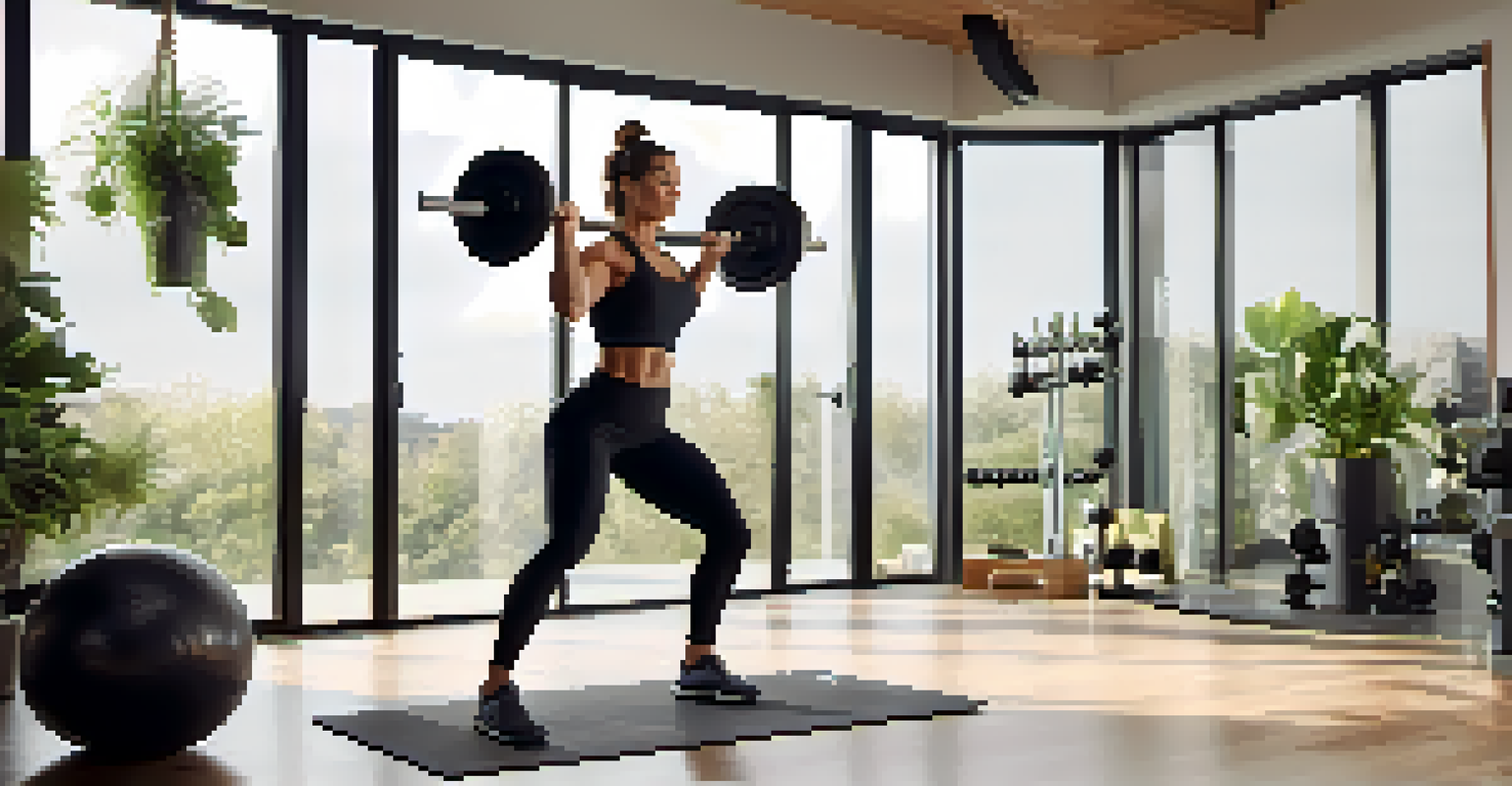The Role of Exercise in Women's Health and Well-Being

Understanding the Importance of Exercise for Women
Exercise is more than just a way to stay fit; it's a cornerstone of women's health. Regular physical activity helps manage weight, reduces the risk of chronic diseases, and boosts mental health. For women, who often juggle multiple roles, making time for exercise is crucial for maintaining both physical and emotional well-being.
Exercise is a celebration of what your body can do. Not a punishment for what you ate.
Moreover, exercise offers unique benefits tailored to women’s health needs. For instance, it helps alleviate symptoms of PMS and menopause, making those life stages more manageable. Engaging in physical activity can also improve bone density, which is particularly important for women as they age and become more susceptible to osteoporosis.
Incorporating exercise into daily life doesn’t have to be daunting. Whether it’s a brisk walk, yoga, or dancing, finding an enjoyable activity can lead to long-term commitment. Remember, the key is consistency, and even small changes can lead to significant health improvements.
Mental Health Benefits of Regular Exercise
Exercise is often hailed as a natural remedy for stress and anxiety, and for good reason. When women engage in physical activity, their bodies release endorphins, the 'feel-good' hormones that can significantly elevate mood. This can be especially beneficial for those facing the pressures of work, family, and life in general.

In addition to boosting mood, exercise can enhance cognitive function and improve sleep quality. A good workout routine promotes better sleep patterns, which are crucial for mental clarity and emotional stability. For many women, the time spent exercising can serve as a valuable escape, allowing them to recharge and refocus.
Exercise Boosts Women's Health
Regular physical activity is essential for managing weight, reducing chronic disease risk, and enhancing mental well-being in women.
Furthermore, group exercises or classes can foster community and connection, which can combat feelings of isolation. Exercising with others provides social support and motivation, making it easier to stick to a routine. The power of camaraderie in a workout setting can transform exercise from a chore into a shared experience.
Exercise and Weight Management for Women
For many women, maintaining a healthy weight can be a challenge, influenced by various factors including metabolism, hormonal changes, and lifestyle. Exercise plays a pivotal role in weight management by helping to burn calories and build muscle. Muscle tissue burns more calories at rest compared to fat tissue, making strength training an essential component.
The only bad workout is the one that didn’t happen.
Moreover, regular physical activity can help regulate appetite and improve metabolism. This means that women who exercise consistently may find it easier to manage their weight and avoid the ups and downs that often come with dieting. It's about creating a sustainable lifestyle rather than following a temporary fad.
It's important to remember that everyone's weight loss journey is unique. Setting realistic goals and focusing on non-scale victories, like increased energy or improved mood, can make the process more enjoyable and rewarding. Embracing a holistic approach to health can empower women to find balance in their lives.
Strength Training: A Key Component for Women
Many women shy away from strength training, fearing it may lead to a bulky physique. However, strength training is vital for all women as it helps build lean muscle mass, increases bone density, and improves overall functionality. It’s about embracing strength rather than size, and the benefits are extensive.
As women age, maintaining muscle mass becomes increasingly important. Strength training can help combat age-related muscle loss, also known as sarcopenia, ensuring women remain strong and active as they age. It can also enhance joint health, thus reducing the risk of injury in daily activities.
Strength Training is Crucial
Incorporating strength training helps women build lean muscle, improve bone density, and combat age-related muscle loss.
Incorporating strength training into a fitness routine doesn’t require fancy equipment or a gym membership. Bodyweight exercises, resistance bands, or even household items can be effective tools. The key is to start gradually and focus on proper form to reap the full benefits safely.
Cardio Exercise: Heart Health for Women
Cardiovascular exercise, commonly known as cardio, is crucial for maintaining heart health. It's especially important for women, who may face unique cardiovascular risks, particularly post-menopause. Engaging in regular cardio workouts can strengthen the heart, lower blood pressure, and improve circulation.
Activities such as walking, running, swimming, or cycling can be easily integrated into daily routines. The American Heart Association recommends at least 150 minutes of moderate-intensity exercise per week, which is achievable with a bit of planning. Even short bursts of activity can contribute to overall cardiovascular health.
Moreover, cardio exercise has the added benefit of improving mood and reducing anxiety, making it a win-win for both physical and mental health. Finding a cardio activity that you enjoy will make it easier to stay committed and benefit from its numerous advantages.
Flexibility and Balance: Essential for Women's Health
Flexibility and balance are often overlooked components of a well-rounded fitness routine, but they are particularly important for women. As we age, flexibility can decrease, leading to stiffness and an increased risk of injury. Incorporating flexibility exercises, such as stretching or yoga, can enhance mobility, making daily activities easier and more enjoyable.
Balance exercises are equally vital, especially for older women who may be at risk of falls. Simple practices, like tai chi or balance-focused workouts, can significantly improve stability. A strong sense of balance can lead to greater confidence in movement and reduce fear of falling.
Flexibility and Balance Matter
Adding flexibility and balance exercises to your routine can enhance mobility, reduce injury risk, and promote overall health.
Integrating flexibility and balance training into your routine doesn’t have to be time-consuming. Simple stretches or balance exercises can be done at home and only take a few minutes. Prioritizing these elements can lead to a more holistic approach to fitness and overall well-being.
Creating a Sustainable Exercise Routine for Women
Establishing a sustainable exercise routine can be challenging, but it’s essential for long-term health. Start by setting realistic goals that fit your lifestyle, whether it’s committing to a certain number of workouts per week or gradually increasing intensity. The journey to fitness is personal, and what works for one person may not work for another.
It's also crucial to listen to your body. Some days may require lighter workouts or rest, and that’s perfectly okay. Flexibility in your routine can prevent burnout and keep you motivated. Remember, consistency is more important than perfection.

Finding a workout buddy or joining a class can provide the encouragement needed to stay on track. Sharing goals and celebrating achievements together can make the journey enjoyable and fulfilling. Ultimately, the best routine is one that feels good and fits seamlessly into your life.